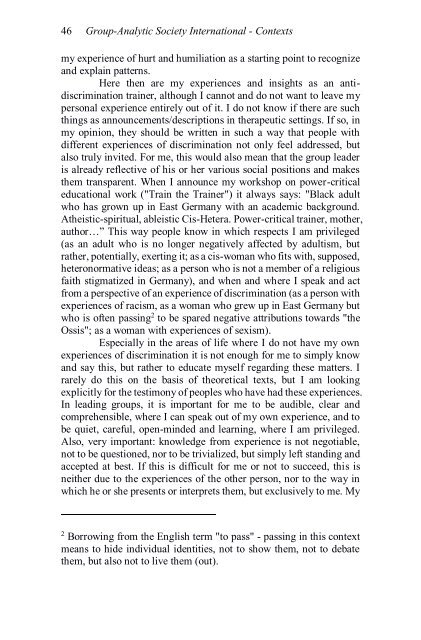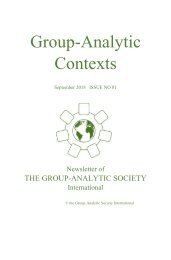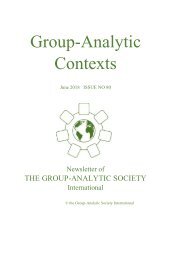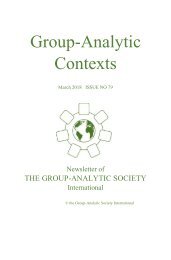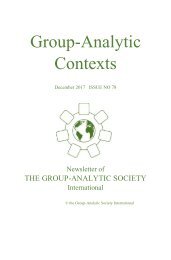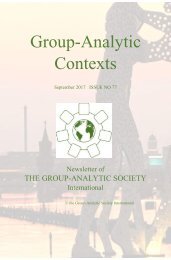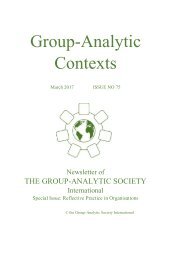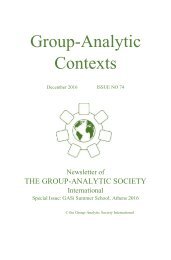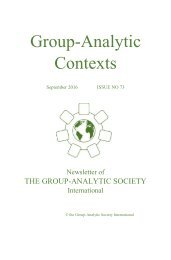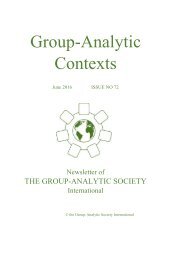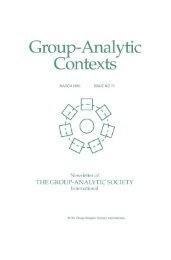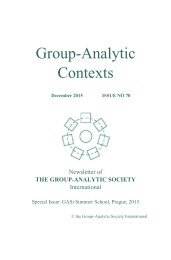Group-Analytic Contexts, Issue 76, June 2017
Special Issue: Preparing for the Berlin Symposium
Special Issue: Preparing for the Berlin Symposium
You also want an ePaper? Increase the reach of your titles
YUMPU automatically turns print PDFs into web optimized ePapers that Google loves.
46 <strong>Group</strong>-<strong>Analytic</strong> Society International - <strong>Contexts</strong><br />
my experience of hurt and humiliation as a starting point to recognize<br />
and explain patterns.<br />
Here then are my experiences and insights as an antidiscrimination<br />
trainer, although I cannot and do not want to leave my<br />
personal experience entirely out of it. I do not know if there are such<br />
things as announcements/descriptions in therapeutic settings. If so, in<br />
my opinion, they should be written in such a way that people with<br />
different experiences of discrimination not only feel addressed, but<br />
also truly invited. For me, this would also mean that the group leader<br />
is already reflective of his or her various social positions and makes<br />
them transparent. When I announce my workshop on power-critical<br />
educational work ("Train the Trainer") it always says: "Black adult<br />
who has grown up in East Germany with an academic background.<br />
Atheistic-spiritual, ableistic Cis-Hetera. Power-critical trainer, mother,<br />
author…” This way people know in which respects I am privileged<br />
(as an adult who is no longer negatively affected by adultism, but<br />
rather, potentially, exerting it; as a cis-woman who fits with, supposed,<br />
heteronormative ideas; as a person who is not a member of a religious<br />
faith stigmatized in Germany), and when and where I speak and act<br />
from a perspective of an experience of discrimination (as a person with<br />
experiences of racism, as a woman who grew up in East Germany but<br />
who is often passing 2 to be spared negative attributions towards "the<br />
Ossis"; as a woman with experiences of sexism).<br />
Especially in the areas of life where I do not have my own<br />
experiences of discrimination it is not enough for me to simply know<br />
and say this, but rather to educate myself regarding these matters. I<br />
rarely do this on the basis of theoretical texts, but I am looking<br />
explicitly for the testimony of peoples who have had these experiences.<br />
In leading groups, it is important for me to be audible, clear and<br />
comprehensible, where I can speak out of my own experience, and to<br />
be quiet, careful, open-minded and learning, where I am privileged.<br />
Also, very important: knowledge from experience is not negotiable,<br />
not to be questioned, nor to be trivialized, but simply left standing and<br />
accepted at best. If this is difficult for me or not to succeed, this is<br />
neither due to the experiences of the other person, nor to the way in<br />
which he or she presents or interprets them, but exclusively to me. My<br />
2<br />
Borrowing from the English term "to pass" - passing in this context<br />
means to hide individual identities, not to show them, not to debate<br />
them, but also not to live them (out).


